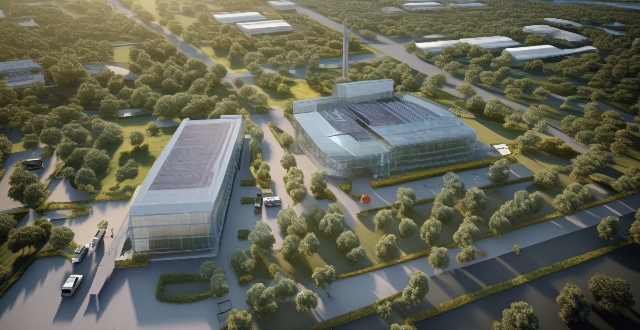Renewable energy sources play a crucial role in the construction and operation of energy-efficient buildings, providing clean, sustainable power that reduces reliance on fossil fuels and helps mitigate climate change. Solar energy is one of the most popular renewable energy sources used in energy-efficient buildings, harnessing the power of the sun to generate electricity or heat water for use in buildings. Wind energy converts the kinetic energy of wind into electricity, which can then be used to power buildings. Geothermal energy involves harnessing the heat from the earth's core to provide heating and cooling for buildings. Biomass energy uses organic materials such as wood chips, crop waste, and animal manure to generate heat and electricity for buildings. Hydropower involves using the energy of moving water to generate electricity. Incorporating these technologies into building designs and operations can create more sustainable and environmentally friendly structures that benefit both people and the planet.

The Role of Renewable Energy Sources in Energy-Efficient Buildings
Renewable energy sources play a crucial role in the construction and operation of energy-efficient buildings. These sources provide clean, sustainable power that reduces reliance on fossil fuels and helps mitigate climate change. In this article, we will explore the various ways renewable energy sources contribute to energy-efficient buildings.
Solar Energy
Solar energy is one of the most popular renewable energy sources used in energy-efficient buildings. It involves harnessing the power of the sun to generate electricity or heat water for use in buildings. Some key benefits of solar energy include:
- Reduced Energy Costs: By generating their own electricity, buildings can significantly reduce their energy costs over time.
- Low Maintenance: Once installed, solar panels require minimal maintenance and can last for decades.
- Environmental Benefits: Solar energy produces no harmful emissions, making it an environmentally friendly choice for powering buildings.
Wind Energy
Wind energy is another renewable source that can be utilized in energy-efficient buildings. Wind turbines convert the kinetic energy of wind into electricity, which can then be used to power buildings. Some advantages of wind energy include:
- Scalability: Wind turbines can be scaled up or down depending on the size of the building and its energy needs.
- Cost-Effectiveness: While initial installation costs can be high, wind energy can be cost-effective in the long run due to lower operating costs.
- Reliability: Wind is a consistent source of energy, making it a reliable option for powering buildings.
Geothermal Energy
Geothermal energy involves harnessing the heat from the earth's core to provide heating and cooling for buildings. This renewable source offers several benefits, including:
- Efficiency: Geothermal systems are highly efficient and can significantly reduce heating and cooling costs in buildings.
- Sustainability: As an infinite resource, geothermal energy is a sustainable option for powering buildings.
- Low Maintenance: Geothermal systems require minimal maintenance and have a long lifespan.
Biomass Energy
Biomass energy involves using organic materials such as wood chips, crop waste, and animal manure to generate heat and electricity for buildings. Some advantages of biomass energy include:
- Waste Reduction: By using waste materials as fuel, biomass energy helps reduce waste and promote sustainability.
- Cost-Effectiveness: Biomass fuels are often less expensive than traditional fossil fuels, making them a cost-effective option for powering buildings.
- Versatility: Biomass energy can be used in a variety of applications, including heating, cooling, and electricity generation.
Hydropower
Hydropower involves using the energy of moving water to generate electricity. While typically associated with large-scale power generation, hydropower can also be utilized in small-scale applications for individual buildings. Some benefits of hydropower include:
- Reliability: Hydropower is a consistent source of energy, making it a reliable option for powering buildings.
- Low Emissions: Hydropower produces no harmful emissions during operation, making it an environmentally friendly choice for powering buildings.
- Longevity: Hydropower infrastructure has a long lifespan, providing a stable source of energy for many years.
In conclusion, renewable energy sources play a vital role in energy-efficient buildings by providing clean, sustainable power that reduces reliance on fossil fuels and helps mitigate climate change. By incorporating solar, wind, geothermal, biomass, and hydropower technologies into building designs and operations, we can create more sustainable and environmentally friendly structures that benefit both people and the planet.